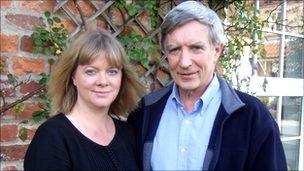The Spirit Level: Britain's new theory of everything?
- Published

Richard Wilkson and Katie Pickett co-authored The Spirit Level
Both Prime Minister David Cameron and Labour leader Ed Miliband appear to be disciples of The Spirit Level, a book that claims to prove that Britain's unequal society is causing chronic health and social problems for everyone, including the rich.
But does the controversial theory hold up?
It is not every day that a future British Prime Minister name checks someone from the rarefied world of social epidemiology. But a few months before being elected, David Cameron did just that.
"Research by Richard Wilkson and Katie Pickett has shown that among the richest countries, it's the more unequal ones that do worse according to almost every quality of life indicator," he said.
The new Labour leader Ed Miliband also seemed to cite the provocative new theory. "The gap between rich and poor does matter," he proclaimed recently. "And it doesn't just harm the poor, it harms all of us."
These political leaders are just two of the many people influenced by The Spirit Level, a scientific book turned surprise best-seller with almost 100,000 sold.
Status competition
This means the wealthy and middle class in unequal countries, like Britain or the USA, do worse than their equivalents in more equal Sweden or Japan, according to co-authors Professor Richard Wilkinson and Professor Kate Pickett.
"The countries with the biggest gap between the rich and the poor have the highest level of whatever health and social problem it is we're looking at," said Professor Pickett.
Unequal societies "have more violence, they have higher teenage birth rates, they have more obesity, they have lower levels of trust, they have lower levels of child well-being, community life is weaker and more people are in prison," adds Professor Wilkinson.
The argument is that inequality actually causes all these social problems, because unequal places like the UK or USA are more socially competitive places to live in than Sweden or Japan.
To support their argument, they use data from 23 countries, and 50 US states - in other words, societies already wealthy enough to provide the basics for their citizens, so it is obesity or heart attacks that are bigger worries than diseases caused by poverty.
Dangerous idea?
Vocal critics call these ideas "dangerous" because according to them, it dresses up a political position as a matter of scientific fact.
"The problem I have is when politics get wrapped up as if they were something else," says Professor Peter Saunders, who wrote a counter-argument to The Spirit Level published by the right-of-centre think tank Policy Exchange.
He says he is "shocked" by the statistics used in the book. The authors have rejected his criticisms.
But beyond the tit-for-tat exchanges about the numbers being used, does The Spirit Level have a point when it argues that inequality can actually cause everyone to suffer - including the rich?
Feelings matter
The reason inequality matters, according to the book, is because of "psycho-social" factors - like status anxiety.
"What social epidemiologists have learned over the past few decades is how important feelings are for health," explains Professor Pickett.

Can inequality be a contributing factor to obesity?
The book draws on studies that show that primates, like monkeys or chimpanzees, react at a biological level when they are placed in socially stressful situations - such as bringing a dominant male down in the social hierarchy.
Humans, too, seem to show similar reactions to social stress in some cases. This anxiety can affect our nervous and endocrine systems.
This is a new and still controversial area of science. A recent review said that more research is needed.
Still, The Spirit Level's argument has caused ripples because it says the size of the gap between rich and poor is what matters - so helping the poorest will not be enough on its own.
Poverty or inequality?
In effect, it is a reversal of the political orthodoxy. For decades Britons were told that growing inequality did not matter, because of the belief that "a rising tide lifts all boats".
Tony Blair famously declared that he did not care what David Beckham earned - but that tackling child poverty was important.
The Spirit Level argues something very different, and that has caused concern in unexpected quarters.
"As I read through the book, I have to say that my reaction was one of increasing dismay," said John Goldthorpe of Nuffield College, Oxford.
He is someone who you might expect to support the book, because he is a leading sociologist of the impact of class.
But Professor Goldthorpe argues that there is an alternative, "neo-material" explanation to why countries like Sweden do better than the UK.
"What matters is not so much the way in which inequality gets under your skin, but the more direct physical effects of inequality on health and other aspects of well-being," he says.
The "neo-materialists" say all the talk about status anxiety and "psycho-social" factors can detract from the important business of putting in money to improve the lives of the poor.
In other words, they argue that poverty matters - not just inequality.
Rising Damp
So if you live in a small home, what is a bigger cause of health and social problems: the damp in your bedroom, or the loss of social status against your friends?
Professor Pickett says: "The differences are too big to be explained by what's happening to the few people who live in seriously sub-standard housing."
Instead, it is "what your housing says about you - your sense of how your housing reflects your status, the fact that you live on an estate that other people look down upon that limits your chances to feel you're a functioning member of society".
The authors of The Spirit Level reject the people on both the right and left who say their work rests on inadequate science and incomplete explanation. They say their theory has put inequality back on the agenda.
"We have spent a number of years waking up every morning, turning on the radio and listening to debates about why we have a high level of teenage pregnancy in Britain or other kinds of problems, and never hearing the level of inequality in the UK even mentioned as a possible cause," says Professor Pickett.
"Now that's changed, and that's what we wanted to achieve with this book and we're very happy with that."
- Published8 October 2010